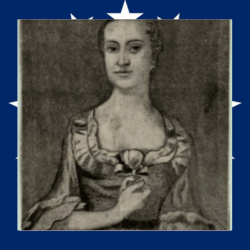
What does it mean to be loyal to one’s beliefs, even when it is challenging? This question is particularly tough to answer After all, displaying your allegiance to one cause or another was incredibly difficult, especially as women were often expected to occupy space predominantly within the private sphere (the home) and not necessarily given a free platform to express their beliefs.
During the American Revolution, it is not hard to believe that people felt constrained in their choices, especially women, but that did not deter many of them from getting involved and participating in movements that they believed were worthy of action. Penelope Barker, a North Carolinian born in 1728, serves as an excellent example of such perseverance.
In 1755, at the age of 27, she was married to the wealthy planter James Craven—the two were devoted patriots in their union. Unfortunately, following two years of marriage, James passed away, leaving his estate entirely to Penelope. Despite her newly amassed wealth, she had children to take care of and traditional social conventions dictated that she must remarry. In 1761, she married the attorney Thomas Barker, who shared the same patriotic allegiance to independence as Penelope’s first spouse. As tensions between Britain and the colonies rose, Barker traveled to England as an advocate of the colony’s independence but was left trapped there for the next 15 years as the Revolutionary War broke out and British Navel blockades formed.
Imagine being in Penelope’s shoes: alone and with 5 children and her husband far away. Penelope was not one to give up, however. She found comfort and strength amongst the many other women who similarly found themselves with partners far away. The social gatherings she attended started as simple get-togethers but evolved into powerful meetings where these women discussed important political actions.
Penelope organized nearly 50 women in the boycott of British tea, hosting the Edminton Tea Party to display their allegiance to the Revolutionary troops; they drank American tea and made it clear they would no longer give their support to British trade. This event became known across the continents, with news even making it all the way to London and appearing in the papers. What some may have considered as the “small” act of hosting a tea party amongst local women became deeply politicized, permanently enshrining Penelope as a protester of the American Revolution.
Following the war in 1778, her husband was finally able to return home and Penelope shifted her interests towards the lives of their children and grandchildren. She had successfully played her part as a protester and advocate for justice. Unfortunately, Penelope passed away in 1796 due to reasons unknown. She is buried next to her husband on the estate they owned together.
